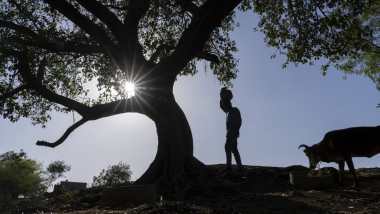Climate change impacts millions in India. But as the country votes, some politicians skirt the issue
Almost 970 million Indians are voting in general elections amid sweltering heat and unpredictable weather extremes exacerbated by human-caused climate change, leading to loss of livelihood, forced migration and increasingly difficult living conditions for millions across the country.
Voters are looking for politicians who promise relief, stability and resilience to the wide-ranging and damaging effects of a warming climate. In their election manifestos, India’s top political parties, including the governing Bharatiya Janata Party and the main opposition, the Congress party, have made multiple promises to act on climate damage and reduce emissions of planet-heating gases.
But there has been little talk about climate change on the campaign trail.
“Climate change is still not among the headlines during these elections despite its obvious impact on millions of Indian lives,” said Anjal Prakash, author of multiple United Nations climate reports.
